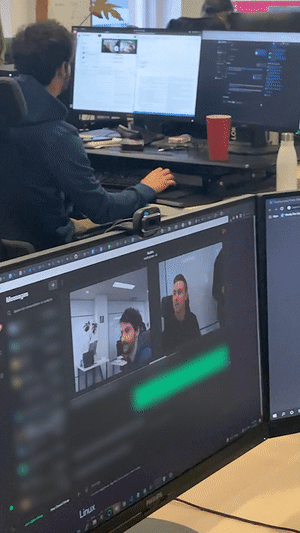No caller ID: Calls on Session
December 07, 2021 / Alex LintonTechnical
Voice calls are available now! To join the beta, check your app settings.
Voice and video calls have been Session’s most requested feature ever since we launched. Calling has become a core feature of most other messengers, and it’s an important step for Session’s development.
As we always do, we wanted to build a call solution which wouldn’t sacrifice your privacy, security, or safety in any way. Our development process for calls involves first creating a robust calling implementation in Session, and then adding onion-routing capabilities to that calling implementation. With this in mind, Session will have a 2-stage rollout for calls.
Our first stage is an opt-in beta release of our peer-to-peer calling implementation. This is available while we complete the Lokinet integration required to make onion-routed calls possible. Once Lokinet integration is complete, onion-routed calls will be released as the second stage of the rollout.
Give the people what they want: why we’re releasing P2P calls
Due to the increased complexity of adding onion-routing to calls—a world first in a messaging app—we always knew it would take us a bit longer to finish off our onion-routed call implementation than the peer-to-peer calling solution.
Initially, we only planned to test peer-to-peer calls internally with our QA team and our squad of Session alpha-testers. We weren’t going to release peer-to-peer calls publicly at all, instead we were going to wait for the release of fully-fledged onion-routed calls.
However, as Session’s user base has boomed over the last 6 months, there was one feature people were increasingly crying out for — calls. Voice calls are a must-have for modern messengers, and as more people were migrating across to Session, it was one of the main things stopping them from being able to convince their friends, family, and colleagues to move across with them. Because of that feedback, we decided to do some formal consultation with the community to see whether people would prefer to wait a little longer for onion-routed calls, or if they wanted the instant gratification of a peer-to-peer release.
As the old saying goes, ‘don’t let perfect be the enemy of good’. While onion-routed calls are an exciting, ground-breaking feature that everybody is eagerly awaiting, that doesn’t mean that peer-to-peer calls aren’t a great calling solution as well.
Onion-routed calls: What’s the big deal?
As you probably know, Session onion-routes all its messages using a protocol called onion requests to help protect your privacy and anonymity, but maintaining onion-routing for calling is a much more difficult task. Onion requests only support the transmission of TCP-based protocols (like HTTP) and have limitations on the maximum request size (about 6mb). This means onion requests can’t support streaming of multipart requests — which is required for high-bandwidth activity like calls. There are some TCP streaming protocols out there, but the latency of onion requests makes them unsuitable for carrying those protocols in real-time.
This is not to say that Onion-routing isn’t an important tool to help protect your privacy, but traditional onion routing protocols (onion requests included) have very high latency which makes things like streaming voice and video for calling virtually impossible. But that’s okay, because our purpose-built onion-router, Lokinet, is faster, more efficient, and gives Session the ability to make those onion-routed calls possible.
This is why Session’s calling implementation is so groundbreaking. We had to create an entirely new onion-routing protocol from the ground up to make it possible, as opposed to relying on existing onion networks. That was a huge undertaking in terms of network infrastructure and development, but we are so, so close. In our early tests conducting calls over Lokinet, the latency is similar or better than an international phone call. Once we have completed our Lokinet implementation, Session will be the most private way you can have a call.
We are super excited about onion-routed calls — it’ll be the biggest feature release in Session’s history. You can expect more info about the release as we get closer, but in the meantime you can help us beta test peer-to-peer calling.
Peer-to-peer calls: How you’re helping
The peer-to-peer calls beta is live now! By participating in the P2P call beta, you can help us:
Test calling user interface and user experience
Deliver onion-routed calls more quickly
Enjoy calling your friends and family on Session
Privacy
Our P2P calls offers a similar level of privacy to other messaging apps such as Signal, however, P2P calls do not offer the same IP protections as onion-routing.
This means when you make a call you will expose your IP address to an Oxen foundation (OPTF) operated STUN/TURN server and to the other call participant. Before you enable P2P calls, make sure you assess your own personal situation to determine whether the risk of exposing your IP is worth it. For those of you who cannot risk exposing your IP — onion-routed calls are on the way.
Encryption
All calls are webRTC voice calls are end-to-end encrypted. This is handled by the webRTC protocol which uses a combination DTLS and SRTP to encrypt voice and video data streams and connection metadata. All this means that the only person who can hear your voice or see you on video is the other participant in the call.
Settings
P2P calls are an experimental feature which you will need to enable in your app settings. If you are extremely concerned about your privacy, or need to ensure with high reliability that your Session ID is not connected to your real identity, we do not recommend participating in the call beta program. However, for the vast majority of users P2P calls should offer a high level of privacy and security.
For those users who choose not to enable calls, your IP address will never be exposed, since connection to a STUN/TURN server requires you to opt-in to calls as a feature in your settings.
Chat soon
We are testing calls every day — you have probably seen some sneak peeks of our internal tests being posted on our social media channels over the last few weeks. Now, you can finally test out P2P calls for yourself. If you want to keep up to date with everything that is going on in the world of calls, make sure to follow Session on Twitter or join the Session open group.
We hope you enjoy your private, encrypted calls — chat soon.
Introducing the Session Network Page
June 04, 2025 / Session
Migrating from the Oxen Network to Session Network
May 19, 2025 / Session
Get Involved: How to Support and Contribute to Session’s Growth
March 27, 2025 / Session
End-to-End Encryption: Why It’s Essential in Modern Communication
March 11, 2025 / Session
Groups v2: How to upgrade your group chats on Session
March 10, 2025 / Session
How to Protect Your Privacy Online: 5 Simple Steps to Take Back Control
February 11, 2025 / Session


